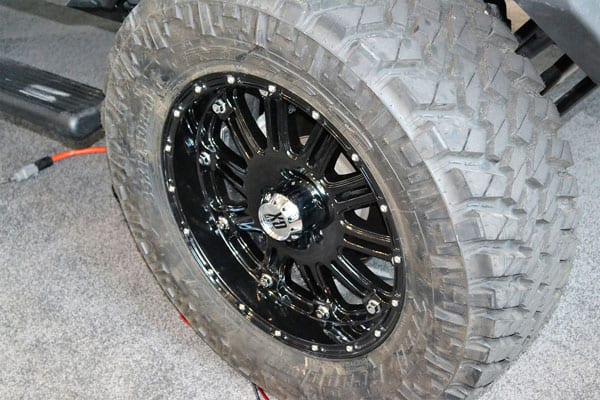Table of Contents
All Terrain Vs All Season Tires – Which Are Better?
Are you currently in the market for new tires for your truck or SUV and wondering if you should go with all terrain or all season tires? Well, this article will explain the main differences between all terrain vs all season tires and help you better decide which type of tire is best for you.
So which is better all season tires vs all terrain tires? All season tires are designed to be used on flat pavement and offer better wet and dry performance than all terrain tires while on the road. All terrain tires have large grooves and are designed to provide better wet and dry performance while off road.
So it really comes down to how you use your truck or SUV if you should go with all terrain or all season tires. Obviously most people (at least in the US) are going to be driving on roads to get around so it would make more sense to buy all season tires.
However, if you live in a rural area with gravel roads or just like to do a lot of off roading then it would make more sense for you to purchase all terrain tires as they will offer better performance will driving on gravel during off road situations.
But do all terrain tires affect gas mileage? Are all terrain tires designed to be used during the winter months? Do all terrain tires last as long as all season tires? Keep reading to find out.
What Are The Benefits of All Terrain Tires?
All terrain tires are best suited for providing grip off-road when driving on sand, rock, and gravel. All terrain tires do not do as well on the pavement because they have large grooves in them that are designed to grip sand and rock. Where all season tires are designed to provide grip on all surfaces.
What Are The Benefits of All Season Tires?
All season tires are designed to be used all year round and provide a balance between driving on all surfaces such as dry pavement, rain, and snow. However, all season tires are not designed to provide optimal grip off-road.
Are All Terrain Tires Good In Winter?
All terrain tires would be good at providing grip in deep snow but would not provide the best stopping traction on ice, so it really depends on the current conditions outside. A tire’s grip comes down to how the tire was designed, and how much the surface of the tire in contact with the road or ground.
That is why in the winter it’s important to have tires that are not bald as they wouldn’t have any sipes or grooves to provide traction. All terrain tires excel at providing traction to get your vehicle moving but are not as flat as all season tires to provide great stopping power.
If you live in an area that gets a lot of snow and ice you may want to think about getting dedicated snow or winter tires for the winter months. They are designed to offer the best traction and grip during inclement weather. To learn more about snow tires and if they are right for you then check out my other article snow tires vs all season tires.
Do All Terrain Tires Affect Gas Mileage?
Yes, all terrain tires can affect the gas mileage of your car a small percentage when compared to all season tires. All terrain tires are not optimized to drive on asphalt like all season tires and will have a higher rolling resistance when compared to all season tires. The effect on gas mileage will be dependent on how aggressive the tread pattern is.
It would also be dependent on if you planned on going with all season tires instead. The more aggressive the tread pattern on all terrain tires the more rolling resistance that will be created and the faster your car will want to come to a stop.
How Long Should All Terrain Tires Last?
All terrain tires have come a long way in the past few years and have been able to increase their longevity significantly. If you want all terrain tires but also want them to last a long time then you would want to pay attention to the treadwear rating provided by the manufacturer.
For example, the Continental Terraincontact tire linked has a 3 year 60k mile treadwear warranty which is very good for all terrain tires. Michelin also has the Michelin LTX all terrain tire that offers a 60k mile treadwear warranty.
How Long Should All Season Tires Last?
All season tires have traditionally lasted longer than all terrain tires because they are designed to be used on the road and for very long distances. However, recently all terrain tires have almost caught up in regards to tire tread longevity.
For example, the Continental PureContact tires that I purchased have a 70,000-mile warranty which is only 10,000 miles more than the Continental TerrainContact (60,000-mile warranty) all terrain tires that they offer.
Which Is Better All Terrain Or All Season Tires?
When comparing all terrain and all season tires I wouldn’t say that one is better than the other, it comes down to how you plan on using your vehicle. If you plan on taking your vehicle off-roading a lot then you would be better off going with all terrain tires to provide increased grip in off-road situations.
If you are going to be driving on pavement most of the time and don’t plan to take your vehicle off road then you would want to go with all season tires as they would provide the best grip and performance when driving on the road.
Do All Terrain Tires Ride Rough?
All Terrain tires should not create a rough ride when compared to all season tires and may actually create a softer ride if you go with a thicker tire sidewall. Really how your vehicle rides come down to how stiff the tire sidewall is and how much sidewall is there to provide a cushion between your vehicle and the road.
If you inflate your tires to their max PSI they will ride rough. If you went from a tire that had a 5-inch sidewall to a tire with a 1-inch sidewall then you would have a rougher ride.
All Terrain Tires and Tire Noise
The one downside to all terrain tires is the tire noise created by the tread as it rolls across the road. The one thing that people don’t like mainly during the summer months when you drive with your windows down is the sound created by all terrain tires.
The tire sound is amplified the faster you drive so this will be more pronounced driving at highway speeds. If you rarely drive at highway speeds then this won’t really be an issue for you. If you have to commute on the highway daily then this is definitely a consideration that you should take before going with all season tires.
All Terrain Vs All Season Tires In Snow
When comparing all terrain and all season tires performance in the snow all terrain tires should have a slight edge. Because all terrain tires will have larger grooves in between tire treads they will be able to grab at snow better than comparable all season tires.
However, if there is ice on the ground then all season tires should provide better traction to bring you to a stop because more tire tread would be contacting the road surface. With ice you want as much tread as possible to contact the icy surface to bring you to a stop.
That is why snow or winter tires are designed with a lot of small sipes and grooves to help grab at the ice and bring you to a stop. Each tire is different though so if you are going to be driving in winter conditions a lot then you would want to prioritize a tire that is good in snow and ice regardless of if you go with all terrain or all season tires.
All Terrain Vs All Season Tires In Rain
All season tires will be able to provide better grip to the road in rain than with comparable all terrain tires. This comes down to the number of sipes and grooves that tire manufacturers are able to integrate into all season tires. In rainy conditions you want your tires to be able to wick away rainwater from underneath your tire tread so that your tire tread is able to make contact with the road.
All terrain tires have larger tread blocks that are designed to grab gravel and sand, they are not optimized to have sipes in the tread blocks to wick away rainwater. Because of this, all season tires will be the better option in rainy conditions. This is because all season tires have plenty of sipes and grooves to help wick away water increasing grip to the road.
If your tire tread is not able to make contact with the road this can cause hydroplaning which is when you lose control of your vehicle because your tire is not able to grip the road causing you to slide around. If you’ve ever hit a puddle in the road and lost control of your car you have experienced hydroplaning.
Street Tires Vs All Terrain Tires
Street tires are essentially another name for tires that are meant to be used on the road which would include all season, summer, and winter tires. So if you hear someone talking about street tires that is what they are referring to.
All Terrain Vs All Season Tires – In Conclusion
Hopefully, by now you know the differences between all terrain vs all season tires. All season tires are meant to be used on the road and will have better on-road driving grip and wet performance. All terrain tires offer better performance while driving off-road on rock, gravel, and sand but can be loud while driving on the road.
If you are going to be taking your Jeep or truck off-road a lot then it makes sense to buy all terrain tires. If you mainly use your Jeep, truck, or SUV to drive down paved roads then it would make more sense for you to buy all season tires as they will perform better on the road than all terrain tires.

